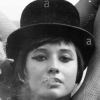Anyone who thinks that Anita and others are angling for a way to censor games that don't comply with some hypothetical list of "demands" she supposedly has is an idiot. If that's you, sorry, not sorry -- I'm not about to mince words with anyone on this topic. That very idea is basically the fuel behind all the vitriol that the gamergate crowd is laying, disproportionately and with enthusiastic malice, against female game critics and those who side with them. You're either against GG and what they really stand for, you're one of them, or you're one of the useful idiots they hide behind.
Okay, I think you're getting too emotional here. While I don't believe that it's censorship, but in fact an exercise of freedom of speech, people are allowed to interpret her message any way they see fit. It may be idiotic and asinine to us, but it's how they act upon their views is what matters most.
As for the GG thing, I've heard so many different things about what it is, and how it got started. It took me months to finally find an unbiased article to form a more informed opinion that can be fairly weighed against supporting and opposing views. Now I'm quite sure that there's others out there who are still struggling to do the same, so I wouldn't make it so black and white if I were you. In case you are wondering, I also think the GG's actions are ridiculous and highly unnecessary. Only their alleged motive may sound good in theory.
Pointing out that most games--in fact nearly all games--kowtow to the fantasies of a typical adolescent boy should not be a controversial idea to anyone with a pair of eyes. Neither should the idea that someone critiquing games through the lens of feminist perspective would have something contrary to say about it. The days when games were almost exclusively the domain of adolescent boys has long-since been over, and yet the industries perception of who their core demographic is lags behind -- not always in word, but in deed. As a recent example, Mass Effect's Cmdr. Shephard was originally designed and proposed to be a woman, and when they went looking for publishers everyone basically said "Hey guys, looks like a great game! We just want you to make one, teeny-tiny change..." which was of course to make the protagonist a dude -- This is one of the biggest franchises in recent history, roundly acclaimed, and yet a female protagonist was a scary bet to make in spite of that. That's how embedded the "boys club" mentality is in the games industry.
Indeed and agreed. I mean, who cares, and why should it matter? If you ask me, I do think there's a lack of maturity when it comes to certain games and genres. Everything from the adolescent "sexy female characters" to the immature and tasteless humor relying on lame ass sexual innuendo that I thought was funny back when I was 12. Prime example of this: Bulletstorm.
I've always found the whole sexualization of common games to be annoying, and I'm actually kinda glad that Sarkeesian is pointing that out. I may be a straight [black] man, but I don't wanna see that in every game I pick up. In fact, I've said this many times in person, but nobody ever listened. As a kid, I couldn't care less about anyone's gender on a game. What matters most to me is that a game is fun.
Its not censorship for someone to point out you're being a little or a lot _____ist, when you in fact are. Someone needs to call people out on their bullshit.
Well said, but it seems to me that these days, just because so and so says that this is "_____ist", it automatically is, and therefore should be dealt with. I don't think that everything is a result of an "ism", but even when it's just ignorance or immaturity, someone's gotta call it.
And most especially of all its increadibly hypocritical to cry over Anita and Co's "attempted censorship" and then to turn around and commit threats of death, violence, rape, and terror in an effort to achieve the same censorship of their criticism -- that's entirely beyond the pale.
This. As I said before, if you don't like it, just ignore it; in droves if you have to, but trolls don't deserve respect.
Shogun
Yea I think most of us here agree that it's not censorship. It can lead to censorship, but after more thought, I think that this is unlikely. After more thought, I think it's more likely for games to be censored due to violence or something rather than sexism or stereotyping. That's how comics first fell under the Code earlier.
Sarkeesian certainly has merit in some of her criticism. There are many games that rely heavily on overt sexualization of women. I do agree that some games could benefit from less of this. There are a lot of things that are nitpicking or things that I honestly don't think really make much sense. I think it's the second part that makes the argument less constructive than it can be. Here's something about the Mass Effect trilogy from the tropes vs women transcript of an episode on the Ms. Male Character:
"Everything we have discussed in this episode thus far has been related to visual design or narrative connection. But there is another way that the Ms. Male Character trope can manifest itself, and that is through marketing and promotional materials. A great illustration of this trend can be found in Bioware’s highly regarded Mass Effect series. The games offer players a choice between a male or female version of the protagonist Commander Shepard (each with a range of cosmetic customizable options). The female option is well designed and her overall narrative is also nearly indistinguishable from her male counterpart’s, aside from some of the romance options.
However, if we take a step back from the game experience itself and look at the marketing campaigns for the trilogy, we see that the female variant of Shepard is practically non-existent. In mainstream advertising of the franchise, the male commander is used almost exclusively. His image is front and center on the box covers for all releases including the special editions. He is the one featured in the TV commercials, teasers, trailers, web banners, street posters and print ads and his face appears on most of the magazine covers. All of this positions the male Commander Shepard as the default protagonist of the series.
Clip- Mass Effect Trilogy Trailer
“One man, one very specific man, might be all that stands between humanity and the greatest threat of our brief existence.”
That is how Bioware is selling the Mass Effect experience. Nearly everything about the advertising campaign explicitly tells players that Commander Shepard is a man and by extension associates the official storyline with the male version of the hero. This marketing strategy contributes to the fact that only 18-20% of players choose the female option (despite the fact that Jennifer Hale’s voice acting is widely praised as being far superior).
Clip- Mass Effect 3
“You brought me here to confirm what you already know: The reapers are here.”
Still, the female version has a dedicated fanbase who frequently refers to her as “FemShep”. And although this is meant as an affectionate nickname, it does further highlight her designation as a Ms. Male Character. She is the one with the qualifier attached to her name. She is “Female Shepard” whereas the male version simply gets to be, “Shepard”.
During the advertising of Mass Effect 3, Bioware made a little more effort to include female Shepard with items like an alternate reversible slip cover for the game box (which features the male version by default) as well as a special web only trailer but these gestures feel like an afterthought or niche specialty marketing and hardly what I would call a substantial or equitable inclusion.
While Mass Effect’s advertising strategy might not undermine the story or gameplay, it is a glaring example of how the Ms. Male Character trope can be perpetuated by marketing departments unless careful consideration is given to how gender is represented when advertising games that do offer players a choice."
I'm curious what people think of this excerpt. In my opinion, I don't think this argument has merit. I encourage people to read the rest of the transcript of the episode as well at this link: http://www.feministfrequency.com/2013/11/ms-male-character-tropes-vs-women/
In this link: http://www.feministfrequency.com/2014/08/women-as-background-decoration-part-2/ I feel that there is some merit to the arguments, but again I'm curious what people think.
This is a link to something the OP stated (the damsel in distress): http://www.feministfrequency.com/2013/05/damsel-in-distress-part-2-tropes-vs-women/
There is some merit, in some ways, but in other ways, I think that it's a plot device that many have used and many have not used. People have also done the opposite. Again, I'd love to hear thoughts.
Her angle is that these console and computer games that are a work of fiction somehow contribute to sexism and misogyny in the real world.
Perhaps the confusion here is that games engaging in sexism and misogyny is sexism and misogyny in the real world.
Let's do a little bit of substitution. If you encountered a computer game in which you wore a white robes and a pointed hood while pursuing and stringing up people of colour, would you insist it was not racist? Would you hold your head up high while you crow about how it's one of your fantasies and no one is being harmed in reality? Would you call "Censorship!!!1! Come see the oppression inherent in the system!!!" if some people of colour denounced it and stated overtly that in their opinion games makers should not make such games?
I'm not sure if that's quite equivalent for the argument about sexism in games. It might be in some cases, but not all of them. The argument here is about the portrayal of women in games, not necessarily the gameplay itself. There are some games that straight up involve gameplay that is questionable.
Out of curiosity, what do people think of Heavenly Sword? Would it be considered as sexist? Certainly the main character is scantily clad, so sexualization is an issue.














